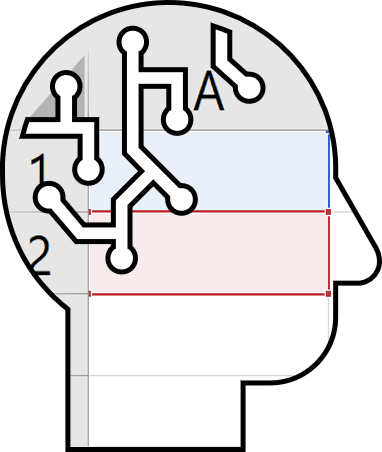Workshop: Intelligence in Spreadsheets and End-User Programming (ISEUP)VL/HCC 2020
This workshop has been cancelled.
The organising committee regrets that the workshop has been cancelled due to ongoing uncertainty around COVID-19.

This workshop on Intelligence in Spreadsheets and End-User Programming will provide a venue for exploring issues that arise in designing, developing and evaluating intelligent and inferential user interfaces for spreadsheets and other end-user programming contexts.
Spreadsheets and end-user programming are empowering technologies that transform people’s relationship with technology from users to co-creators. Yet for non-programmers, writing spreadsheets or scripts is difficult, tedious, and error prone. At the same time, advances in AI inference, language modelling, and interface design have led to breakthroughs in productivity tools for professional software developers, such as intelligent code-autocomplete, code navigation, translation, debugging, and more. The same or similar techniques, when applied to end-user programmers (and in particular spreadsheet users) stands to benefit a much broader group of people, creating immense impact.
Advances in AI are opening up new possibilities for enhancing the activity of programming. There are now workshops at machine learning and software engineering conferences, such as MAPL, ML4SE, and LAFI, that are creating active communities of researchers interested in tackling problems at the intersection of AI and programming. However, the focus there is typically on the needs of professional software developers.
The visual languages and end-user programming research community, on the other hand, aims to enhance the experience of a broader population of programmers, namely end-user and novice programmers. Most notably, this community has a long tradition of applying inference methods to make end-user programming more effective and easy, ever since the term “end-user programming” was coined. For example, classics such as Bonnie Nardi’s 1993 book A Small Matter of Programming: Perspectives on End User Computing and the 1993 collection of earlier papers “Watch What I Do: Programming by Demonstration” edited by Allen Cypher document some of these ideas, which in turn have influenced the VL/HCC research community. The resultant work on applying inference to end-user programming (Including those by members of the VL/HCC community) can be found in Your Wish is My Command: Programming By Example (2001) edited by Henry Lieberman, and more recently No Code Required: Giving Users Tools to Transform the Web (2010) edited by Allen Cypher, Mira Dontcheva, Tessa Lau and Jeffrey Nichols. The field has recently grown rapidly, with VL/HCC, IUI, CHI, POPL, and other conference series including many examples of this general approach.
We think the time is right for our community to revisit the aims and ambitions (namely, exploiting inference to enhance end-user programming) of that line of work, in light of the great advances in the capabilities of machine learning in the past decade. Indeed, that was to be the focus of Margaret Burnett’s and Brad Myers’ keynotes at IUI 2020. Our target populations of end-user programmers, novice programmers and spreadsheet users pose unique and interesting challenges that would not have been encountered by research aimed at professional software engineers. Moreover, by focusing our research community on certain grand challenges, such as using AI to reduce barriers to spreadsheets and end-user programming, we have the potential to impact and empower a much broader group of people.
Call for Papers
The organisers of ISEUP 2020 (held in conjuction with VL/HCC 2020) seek original papers on the theme of intelligence in spreadsheets, visual languages, and end-user programming, including but not limited to the following topics:
- guidelines for design of AI for programming
- empirical measures of success for AI enhancements (beyond time and errors)
- novel application domains for spreadsheets (esp. those opened up by AI/ML)
- novel user categories (esp. those opened up by AI/ML)
- applications of well-known AI techniques to spreadsheets (e.g., summarization, translation, clustering, classification, auto-completion)
- explainable, transparent, fair and ethical AI for spreadsheets and programming
- AI assistance for teaching and learning programming
- technology for solving AI/ML tasks in spreadsheets
Examples of relevant research
Here is a list of papers chosen by the organising committee to give an idea of the kinds of research this workshop is aimed at discussing. Do not worry if your area of research is not directly related to one of papers listed below, the list is just to help set a research context.- Abraham, Robin, and Martin Erwig. "Header and unit inference for spreadsheets through spatial analyses." 2004 IEEE Symposium on Visual Languages-Human Centric Computing. IEEE, 2004.
- Gulwani, Sumit, William R. Harris, and Rishabh Singh. "Spreadsheet data manipulation using examples." Communications of the ACM 55.8 (2012): 97-105.
- Sarkar, Advait, et al. "Interactive visual machine learning in spreadsheets." 2015 IEEE Symposium on Visual Languages and Human-Centric Computing (VL/HCC). IEEE, 2015.
- Burnett, Margaret M., and Herkimer J. Gottfried. "Graphical definitions: Expanding spreadsheet languages through direct manipulation and gestures." ACM Transactions on Computer-Human Interaction (TOCHI) 5.1 (1998): 1-33.
- Margaret Burnett, Sherry Yang, and Jay Summet, "A Scalable Method for Deductive Generalization in the Spreadsheet Paradigm," ACM Transactions on Computer-Human Interaction, Dec. 2002, pp. 253 - 284. Also, here are the (on-line only) appendices.
- Dong, Haoyu, et al. "Tablesense: Spreadsheet table detection with convolutional neural networks." Proceedings of the AAAI Conference on Artificial Intelligence. Vol. 33. 2019.
- Barowy, Daniel W., Dimitar Gochev, and Emery D. Berger. "CheckCell: data debugging for spreadsheets." ACM SIGPLAN Notices 49.10 (2014): 507-523.
- Vaziri, Mandana, et al. "Stream processing with a spreadsheet." European Conference on Object-Oriented Programming. Springer, Berlin, Heidelberg, 2014.